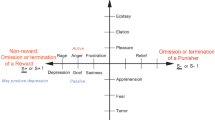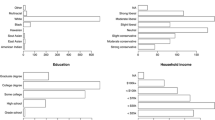Abstract
Humans will, at times, act against their own economic self-interest, for example, in gambling situations. To explore the evolutionary roots of this behavior, we modified a traditional human gambling task, the Iowa Gambling Task (IGT), for use with chimpanzees, capuchin monkeys and humans. We expanded the traditional task to include two additional payoff structures to fully elucidate the ways in which these primate species respond to differing reward distributions versus overall quantities of rewards, a component often missing in the existing literature. We found that while all three species respond as typical humans do in the standard IGT payoff structure, species and individual differences emerge in our new payoff structures. Specifically, when variance avoidance and reward maximization conflicted, roughly equivalent numbers of apes maximized their rewards and avoided variance, indicating that the traditional payoff structure of the IGT is insufficient to disentangle these competing strategies. Capuchin monkeys showed little consistency in their choices. To determine whether this was a true species difference or an effect of task presentation, we replicated the experiment but increased the intertrial interval. In this case, several capuchin monkeys followed a reward maximization strategy, while chimpanzees retained the same strategy they had used previously. This suggests that individual differences in strategies for interacting with variance and reward maximization are present in apes, but not in capuchin monkeys. The primate gambling task presented here is a useful methodology for disentangling strategies of variance avoidance and reward maximization.


Similar content being viewed by others
References
American Psychological Association (2012) Guidelines for Ethical Conduct in the Care and Use of Animals. http://www.apa.org/science/leadership/care/guidelines.aspx
Bakos DS, Denburg N, Fonseca RP, Parente MAdMP (2010) A cultural study on decision making: performance differences on the Iowa gambling task between selected groups of Brazilians and Americans. Psychol Neurosci 3:101–107
Bechara A (2005) Decision making, impulse control and loss of willpower to resist drugs: a neurocognitive perspective. Nat Neurosci 8(11):1458–1463. doi:10.1038/nn1584
Bechara A (2007) Iowa gambling task professional manual. Psychological Assessment Resources, Lutz
Bechara A, Damasio H (2002) Decision-making and addiction (Part I): impaired activation of somatic states in substance dependent individuals when pondering decisions with negative future consequences. Neuropsychologia 40(10):1675–1689. doi:10.1016/s0028-3932(02)00015-5
Bechara A, Damasio H, Tranel D, Damasio AR (1997) Deciding advantageously before knowing the advantageous strategy. Science 275(5304):1293–1295. doi:10.1126/science.275 5304.1293
Beran MJ, Ratliff CL, Evans TA (2009) Natural choice in chimpanzees (Pan troglodytes): perceptual and temporal effects on selective value. Learn Motiv 40(2):186–196
Bowman CH, Turnbull OH (2003) Real versus facsimile reinforcers on the Iowa Gambling Task. Brain Cogn 53(2):207–210. doi:10.1016/s0278-2626(03)00111-8
Bromiley P, Curley S (1992) Individual differences in risk taking. In: Yates F (ed) Risk taking behaviour. Wiley, Chichester, pp 87–132
Brosnan SF, de Waal FBM (2003) Monkeys reject unequal pay. Nature 425(6955):297–299
Brosnan SF, Schiff HC, de Waal FBM (2005) Tolerance for inequity may increase with social closeness in chimpanzees. Proc R Soc B Biol Sci 1560:253–258
Brosnan SF, Parrish A, Beran MJ, Flemming T, Heimbauer L, Talbot CF, Lambeth SP, Schapiro SJ, Wilson BJ (2011) Responses to the assurance game in monkeys, apes, and humans using equivalent procedures. Proc Natl Academy Sci 108(8):3442–3447. doi:10.1073/pnas.1016269108
Brosnan SF, Wilson BJ, Beran MJ (2012) Old World monkeys are more similar to humans than New World monkeys when playing a coordination game. Proceedings of the Royal Society B, Biological Sciences. doi:10.1098/rspb2011.1781
Bunch KM, Andrews G, Halford GS (2007) Complexity effects on the children’s gambling task. Cogn Dev 22(3):376–383. doi:10.1016/j.cogdev.2007.01.004
Cauffman E, Shulman EP, Steinberg L, Claus E, Banich MT, Graham S, Woolard J (2010) Age differences in affective decision making as indexed by performance on the Iowa Gambling Task. Dev Psychol 46(1):193–207
Chiu Y-C, Lin C-H, Huang J-T, Lin S, Lee P-L, Hsieh J-C (2008) Immediate gain is long-term loss: are there foresighted decision makers in the Iowa Gambling Task. Behav Brain Funct 4(1):13
Clutton-Brock TH, Albon SD (1979) The roaring of red deer and the evolution of honest advertisement. Behaviour: 145-170. doi:10.1163/156853979X00449
Clutton-Brock TH, Albon S, Gibson R, Guinness FE (1979) The logical stag: adaptive aspects of fighting in red deer (Cervus elaphus). Anim Behav 27:211–225. doi:10.1016/0003-3472(79)90141-6
Cosmides L, Tooby J (1996) Are humans good intuitive statisticians after all? Rethinking some conclusions from the literature on judgment under uncertainty. Cognition 58(1):1–73. doi:10.1016/0010-0277(95)00664-8
Davis C, Patte K, Tweed S, Curtis C (2007) Personality traits associated with decision-making deficits. Pers Individ Differ 42(2):279–290. doi:10.1016/j.paid.2006.07.006
Evans CEY, Kemish K, Turnbull OH (2004) Paradoxical effects of education on the Iowa Gambling Task. Brain Cogn 54(3):240–244. doi:10.1016/j.bandc.2004.02.022
Evans T, Beran M, Chan B, Klein E, Menzel C (2008) An efficient computerized testing method for the capuchin monkey (Cebus apella): adaptation of the LRC-CTS to a socially housed nonhuman primate species. Behav Res Methods 40(2):590–596. doi:10.3758/brm.40.2.590
Freeman HD, Brosnan SF, Hopper LM, Lambeth SP, Schapiro SJ, Gosling SD (2013) Developing a comprehensive and comparative questionnaire for measuring personality in chimpanzees using a simultaneous top-down/bottom-up design. Am J Primatol. doi:10.1002/ajp.22168
Glicksohn J, Zilberman N (2010) Gambling on individual differences in decision making. Pers Individ Differ 48(5):557–562. doi:10.1016/j.paid.2009.12.006
Glicksohn J, Naor-Ziv R, Leshem R (2007) Impulsive decision-making: learning to gamble wisely? Cognition 105(1):195–205
Hanus D, Call J (2007) Discrete quantity judgments in the great apes (Pan paniscus, Pan troglodytes, Gorilla gorilla, Pongo pygmaeus): the effect of presenting whole sets versus item-by-item. J Comp Psychol 121(3):241–249. doi:10.1037/0735-7036.121.3.241
Haun DBM, Nawroth C, Call J (2011) Great apes’ risk-taking strategies in a decision making task. PLoS ONE 6(12):e28801. doi:10.1371/journal.pone.0028801
Hayden BY, Platt ML (2007) Temporal discounting predicts risk sensitivity in rhesus macaques. Curr Biol 17(1):49–53. doi:10.1016/j.cub.2006.10.055
Hayden BY, Heilbronner SR, Nair AC, Platt ML (2008) Cognitive influences on risk-seeking by rhesus macaques. Judgm Decis Mak 3(5):389–395
Heilbronner SR, Rosati AG, Stevens JR, Hare B, Hauser MD (2008) A fruit in the hand or two in the bush? Divergent risk preferences in chimpanzees and bonobos. Biol Lett 4(3):246–249. doi:10.1098/rsbl 2008.0081
Hooper CJ, Luciana M, Wahlstrom D, Conklin HM, Yarger RS (2008) Personality correlates of Iowa Gambling Task performance in healthy adolescents. Pers Individ Differ 44(3):598–609. doi:10.1016/j.paid.2007.09.021
Horvath P, Zuckerman M (1993) Sensation seeking, risk appraisal, and risky behavior. Pers Individ Differ 14(1):41–52
Kacelnik A, Bateson M (1996) Risky theories—the effects of variance on foraging decisions. Am Zool 36(4):402–434. doi:10.1093/icb/36.4.402
Kahneman D, Tversky A (1979) Prospect theory: an analysis of decision under risk. Econometrica 47(2):263–291. doi:10.2307/1914185
Kerr A, Zelazo PD (2004) Development of “hot” executive function: the children’s gambling task. Brain Cogn 55(1):148–157. doi:10.1016/s0278-2626(03)00275-6
Ladouceur R, Bouchard C, Rhéaume N, Jacques C, Ferland F, Leblond J, Walker M (2000) Is the SOGS an accurate measure of pathological gambling among children, adolescents and adults? J Gambl Stud 16(1):1–24. doi:10.1023/a:1009443516329
Morton FB, Lee PC, Buchanan-Smith HM, Brosnan SF, Thierry B, Paukner A, de Waal FBM, Widness J, Essler JL, Weiss A (2013) Personality structure in brown capuchin monkeys (Sapajus apella): Comparisons with chimpanzees (Pan troglodytes), orangutans (Pongo spp.), and rhesus macaques (Macaca mulatta). J Comp Psychol: No Pagination Specified. doi:10.1037/a0031723
O’Keeffe K (2012) Philippines makes play as a gambling mecca. The Wall Street Journal, April 18, 2012. Retrieved from: http://online.wsj.com/article/SB10001424052702303624004577341330278436226.html
Roche JP, Timberlake W, McCloud C (1997) Sensitivity to variability in food amount: risk aversion is seen in discrete-choice, but not in free-choice trials. Behaviour 134(15/16):1259–1272. doi:10.1163/156853997X00142
Rogers P (1998) The cognitive psychology of lottery gambling: a theoretical review. J Gambl Stud 14(2):111–134. doi:10.1023/a:1023042708217
Rosati AG, Hare B (2012) Decision making across social contexts: competition increases preferences for risk in chimpanzees and bonobos. Anim Behav 84(4):869–879. doi:10.1016/j.anbehav.2012.07.010
Salwiczek LH, Prétôt L, Demarta L, Proctor D, Essler J, Pinto AI, Wismer S, Stoinski T, Brosnan SF, Bshary R (2012) Adult cleaner wrasse outperform capuchin monkeys, chimpanzees and orangutans in a complex foraging task derived from cleaner–client reef fish cooperation. PLoS ONE 7(11):e49068
Sevy S, Burdick KE, Visweswaraiah H, Abdelmessih S, Lukin M, Yechiam E, Bechara A (2007) Iowa Gambling Task in schizophrenia: a review and new data in patients with schizophrenia and co-occurring cannabis use disorders. Schizophr Res 92(1–3):74–84. doi:10.1016/j.schres.2007.01.005
Shafir S (2000) Risk-sensitive foraging: the effect of relative variability. Oikos 88(3):663–669. doi:10.1034/j.1600-0706.2000.880323.x
Steelandt S, Broihanne M, Thierry B (2011) Are monkeys sensitive to the regularity of pay-off? Int J Comp Psychol 24:272–283
Sutton RS, Barto AG (1998) Reinforcement learning: an introduction, vol 1. Cambridge University Press, Cambridge
Trimpop R (1994) The psychology of risk taking behavior. North Holland, Amsterdam
Turnbull OH, Evans CEY, Bunce A, Carzolio B, O’Connor J (2005) Emotion-based learning and central executive resources: an investigation of intuition and the Iowa Gambling Task. Brain Cogn 57(3):244–247. doi:10.1016/j.bandc.2004.08.053
Weber EU, Shafir S, Blais A-R (2004) Predicting risk sensitivity in humans and lower animals: risk as variance or coefficient of variation. Psychol Rev 111(2):430
Wong A, Carducci BJ (1991) Sensation seeking and financial risk taking in everyday money matters. J Bus Psychol 5(4):525–530
Wood S, Busemeyer J, Koling A, Cox CR, Davis H (2005) Older adults as adaptive decision makers: evidence from the Iowa Gambling Task. Psychol Aging 20(2):220–225. doi:10.1037/0882-7974.20.2.220
Wright AA (1999) Visual list memory in capuchin monkeys (Cebus apella). J Comp Psychol 113(1):74
Yen N-S, Chou IC, Chung H-K, Chen K-H (2012) The interaction between expected values and risk levels in a modified Iowa gambling task. Biol Psychol 91(2):232–237. doi:10.1016/j.biopsycho.2012.06.008
Zaleskiewicz T (2001) Beyond risk seeking and risk aversion: personality and the dual nature of economic risk taking. Euro J Personal 15(S1):S105–S122. doi:10.1002/per.426
Zuckerman M (1994) Behavioral expressions and biosocial bases of sensation seeking. Cambridge University Press, New York
Acknowledgments
We thank the animal care and veterinary staff at the Yerkes National Primate Research Center and the Language Research Center for maintaining the health and well-being of the chimpanzees. DP was supported by an American Psychological Association Dissertation Research Award (2011), NIH/NIGMS IRACDA grant K12 GM000680 awarded to Emory University and NSF SES 0847351 awarded to SFB. SFB was funded by NSF CAREER Award SES 0847351, NSF HSD grant SES 0729244 and NSF SES 1123897. At Yerkes, this work was supported by the Living Links Center, Emory’s College of Arts and Sciences and the base grant of the National Center for Research Resources P51RR165 to the YNPRC, currently supported by the Office of Research Infrastructure Programs/OD P51OD11132. The YNPRC is fully accredited by the American Association for Accreditation for Laboratory Animal Care. This research complied with all laws of the United States of America.
Author information
Authors and Affiliations
Corresponding author
Electronic supplementary material
Below is the link to the electronic supplementary material.
Rights and permissions
About this article
Cite this article
Proctor, D., Williamson, R.A., Latzman, R.D. et al. Gambling primates: reactions to a modified Iowa Gambling Task in humans, chimpanzees and capuchin monkeys. Anim Cogn 17, 983–995 (2014). https://doi.org/10.1007/s10071-014-0730-7
Received:
Revised:
Accepted:
Published:
Issue Date:
DOI: https://doi.org/10.1007/s10071-014-0730-7




